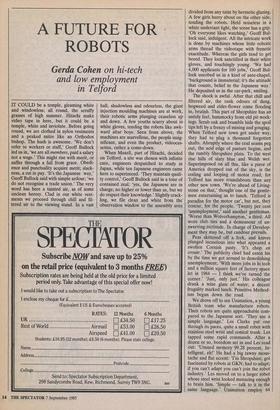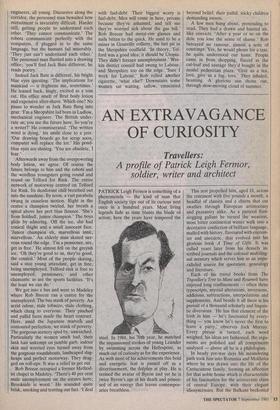A FUTURE FOR ROBOTS
Gerda Cohen on hi-tech
and low employment in Telford
IT COULD be a temple, gleaming white and windowless; all round, the scruffy grasses of high summer. Hitachi make video tape in here, but it could be a temple, white and inviolate. Before going round, we are clothed in nylon vestments and a peaked mitre like an Orthodox bishop. The hush is awesome. 'We don't refer to workers or staff,' Geoff Bullock led us in, 'we are all members, paid a salary not a wage.' This might rise with merit, or suffer through a fall from grace. Obedi- ence and punctuality acquire merit; slack- ness, a cut in pay. 'It's the Japanese way,' Geoff Bullock said with simple ardour; 'we do not recognise a trade union.' The very word has here a tainted air, as of some unclean heresy. Clad in our white vest- ments we proceed through chill and fil- tered air to the viewing stand. In a vast hall, shadowless and odourless, the giant injection moulding machines are at work, their robotic arms plunging ceaseless up and down. A few youths scurry about in white gloves, tending the robots like awk- ward altar boys. Seen from above, the machines are marvellous, the people insig- nificant, and even the product, videocas- settes, rather a come-down.
When Maxell, part of Hitachi, decided on Telford, a site was chosen with infinite care, engineers despatched to study in Japan, while ten Japanese engineers came here to superintend. 'They maintain quali- ty control,' Geoff Bullock said in a tone of contained zeal; 'yes, the Japanese are in charge; no higher or lower than us, but we do respect their knowledge.' Slightly crack- ling, we file clean and white from the' observation window to the assembly area divided from any taint by hermetic glazing. A few girls hurry about on the other side, tending the robots. Held noiseless in a white undeviant light, the scene has a grip. `Oh everyone likes watching,' Geoff Bul- lock said, indulgent. All the intricate work is done by machines whose little robotic arms thread the videotape with frenetic exactitude. Whereas the girls tend to get bored. They look sanctified in their white gloves, and touchingly young. 'We had 4,000 applicants for 160 jobs,' Geoff Bul- lock unrobed us in a kind of ante-chapel, `background is immaterial; it's the attitude that counts, belief in the Japanese way.' He deposited us in the car-park, smiling.
The shock is awful. After that chill and filtered air, the rank odours of dung, hogweed and elder-flower come flooding in, brutish. This part of Shropshire has an untidy feel, hummocky from old pit work- ings. Scrub oak and bramble hide the spoil tips left by a frenzy of mining and gouging. When Telford new town got under way, they had to plug a thousand forgotten shafts. Abruptly where the coal seams peg out, the acid edge of pasture begins, and the rambly Shropshire plain. To the west rise hills of slaty blue and Welsh wet. Superimposed on all this, like a piece of America dropped out of the sky, is the coiling and looping of motor road, for Telford has more roundabouts than any other new town. 'We're ahead of Living- stone on that,' thought one of the gentle- men entertaining us to lunch. 'Telford is paradise for the motor car', but not, they concur, for the people. 'Twenty per cent `unemployment,' said another gentleman. `Worse than Wolverhampton,' a third. All wore club ties and a demeanour of un- swerving rectitude. In charge of Develop- ment they may be, but candour prevails.
Peas skittered off a fork, and knives plunged incautious into what appeared a swollen Cornish pasty. 'It's chop en croute.' The publicity chief had eaten his by the time we got around to demolishing unemployment; 'With more jobs in hi tech and a million square feet of factory space let in 1984 — I think we've turned the corner."Just, only just.' His colleague drank a wine glass of water; a decent frugality marked lunch. Primitive Method- ism begun down the road.
We drove off to see Unimation, a young British team who manufacture robots. Their robots are quite approachable com- pared to the Japanese sort. 'They use a simple language.' Les Clarke put one through its paces, quite a small robot with stainless steel wrist and conical trunk. Les tapped some rapid commands. After a dozen or so, boredom set in and Les read out: 'Unused memory 99.28 percent. In- telligent, eh!' He had a big tawny mous- tache and flat accent: 'I'm Shropshire; got fascinated by robots at GKN; had to adapt; if you can't adapt you can't join the robot industry.' Les moved on to a larger robot whose steel wrist looked menacing enough to brain him. 'Simple — talk to it in the same language.' Unimation employ 64 engineers, all young. Discursive along the corridor, the personnel man bewailed how recruitment is invariably difficult. Harder still, getting people to understand each other. 'They cannot communicate.' The robots communicate perfectly with the computers, if plugged in to the same language, but the humans fail miserably. `They just can't understand each other.' The personnel man flurried into a drawing office; 'you'll find Jack Bate different, he reads poetry.'
Indeed Jack Bate is different, his bright blue eyes questing. 'The implications for mankind — it frightens me, sometimes.' He leaned back, tingly, excited as a torn cat. His office smelt of Brut body lotion and expensive after-shave. Which one? No pause to wonder as Jack Bate flung into gear: 'I'm a Shropshire lad born in Ludlow, mechanical engineer. The British under- rate us; you see the future here. So you're a writer?' He commiserated. 'The written word is dying,' his smile close to a jeer. `Our drawing boards go for scrap soon, computer will replace the lot.' His pond- blue eyes are shining. 'You are obsolete, I fear.'
Afterwards away from the overpowering body lotion, we agree. Of course the future belongs to him and the robots and the wordless youngsters going round and round on Telford Ice Rink. The entire network of motorway centred on Telford Ice Rink. Its deodorant chill breathed out into the sunshine. By noon, a vast parabola swung in ceaseless motion. Right in the centre a champion twirled, her breath a spiral above her pert blue flounce. 'She's from Solihull, junior champion.' The boys glide by admiring. Off the ice, she had conical thighs and a small innocent face. `Junior champion eh, marvellous innit, marvellous.' An elderly man skated ner- vous round the edge. 'I'm a pensioner, see, get in free.' He almost fell on the greyish ice. 'Oh they're good to us, they're good, the council.' Most of the people skating, said a nice young attendant, get in free, being unemployed. Telford rink is free to unemployed, pensioners, and other claimants: as are the sports facilities. 'It's the least we can do.'
We got into a bus and went to Madeley where Rob Breeze ran a centre for the unemployed. The bus stank of poverty. An acrid odour, stale tobacco, stale clothing, which clung to everyone. Their pinched and pallid faces made the heart contract. Here, amid the Japanese marvel's and contoured perfection, we stank of poverty. The gorgeous scenery sped by, unwatched. Particularly the women smelt bad, their lank hair unkempt on jumble garb, indoor skin and worried eyes turned away from the gorgeous roundabouts, landscaped slag- heaps and perfect motorway. They drag- ged on roll-ups. It was a relief to get out.
Rob Breeze occupied a former Method- ist chapel in Madeley. 'There's 40 per cent male unemployment on the estates here; Brookside is worst.' He sounded quite brisk, smoking and trotting out fact. 'I deal with fuel-debt. Their biggest worry is fuel-debt. Men will come in here, private because they're ashamed, and tell me they're worried sick about the gas Rob Breeze had metal-rim glasses and nails bitten to the quick. He used to be a miner in Granville colliery, the last pit in the Shropshire coalfield. 'In theory, Tel- ford was a good idea; it should be Utopia. They didn't foresee unemployment.' Wre- kin district council had swung to Labour, and Shropshire too on the edge. 'Sure I work for Labour,' Rob rolled another cigarette, 'what else?' Downstairs some women sat waiting, sallow, emaciated beyond belief, their pallid, sticky children demanding sweets.
A few men hung about, pretending to read. They had a drawn and hunted air, like convicts: 'After a year or so on the dole you lose the sense of shame.' Rob betrayed no rancour, almost a note of contempt. Yes, he would phone for a taxi; he quite understood our haste. People came in from shopping, flaccid as the cut-loaf and sausage they'd bought in the model pedestrian plaza: 'Give us a tea, love, give us a fag, love.' They inhaled, beaming. A glorious sun shone out, through slow-moving cloud of summer.











































 Previous page
Previous page